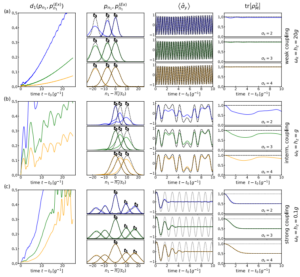
Georg Engelhardt, from the Southern University of Science and Technology in the Shenzhen Institute of Quantum Science and Engineering, will give a seminar entitled «Photon-Resolved Floquet Theory and its application to quantum sensing».
Date: April 11th, 2024, 12:00
Location: Seminar Room (182), ICMM-CSIC
Quantum sensing uses quantum properties of matter to enhance the sensitivity in precision measurements. Besides others, it already finds important applications in atomic clocks, for medical purposes, and in the search for dark matter. Many currently employed quantum sensing protocols exhibit a simple setup, in which a laser probes the optical properties of an ensemble of atoms, molecules, or other quantum emitters, which are subject to the external stimulus to be measured. An important figure of merit to predict the sensitivity is the signal-to-noise ratio. While it is easy to theoretically calculate the signal, the accurate prediction of the noise is challenging.
Motivated by this, we have developed the Photon-Resolved Floquet Theory (PRFT), which besides predicting the state of a driven quantum system (e.g., the atom or molecule), can also predict the number of photons exchanged with the coherent driving field [1,2]. To this end, the PRFT introduces counting fields into the semiclassical equations of motions, that track the photons in the driving field. Interestingly, the PRFT predicts light-matter entanglement in the Floquet-state basis. This effect can be employed to devise a measurement-based quantum communication protocol, which has favorable scaling properties over long distances. We apply the PRFT to spectroscopy, where it can predict the Fisher information of coherent spectroscopic signals [3]. The PRFT thus opens new paths to design and optimize quantum sensors based on AMO systems, which might assist in the discovery of new physics.
[1] G. Engelhardt, S. Choudhury, and W. V. Liu, Phys. Rev. Research 6, 013116 (2024)
[2] G. Engelhardt, JY. Luo, V. M. Bastidas, and G. Platero, arXiv: 2311.01509
[3] G. Engelhardt et al., in preparation